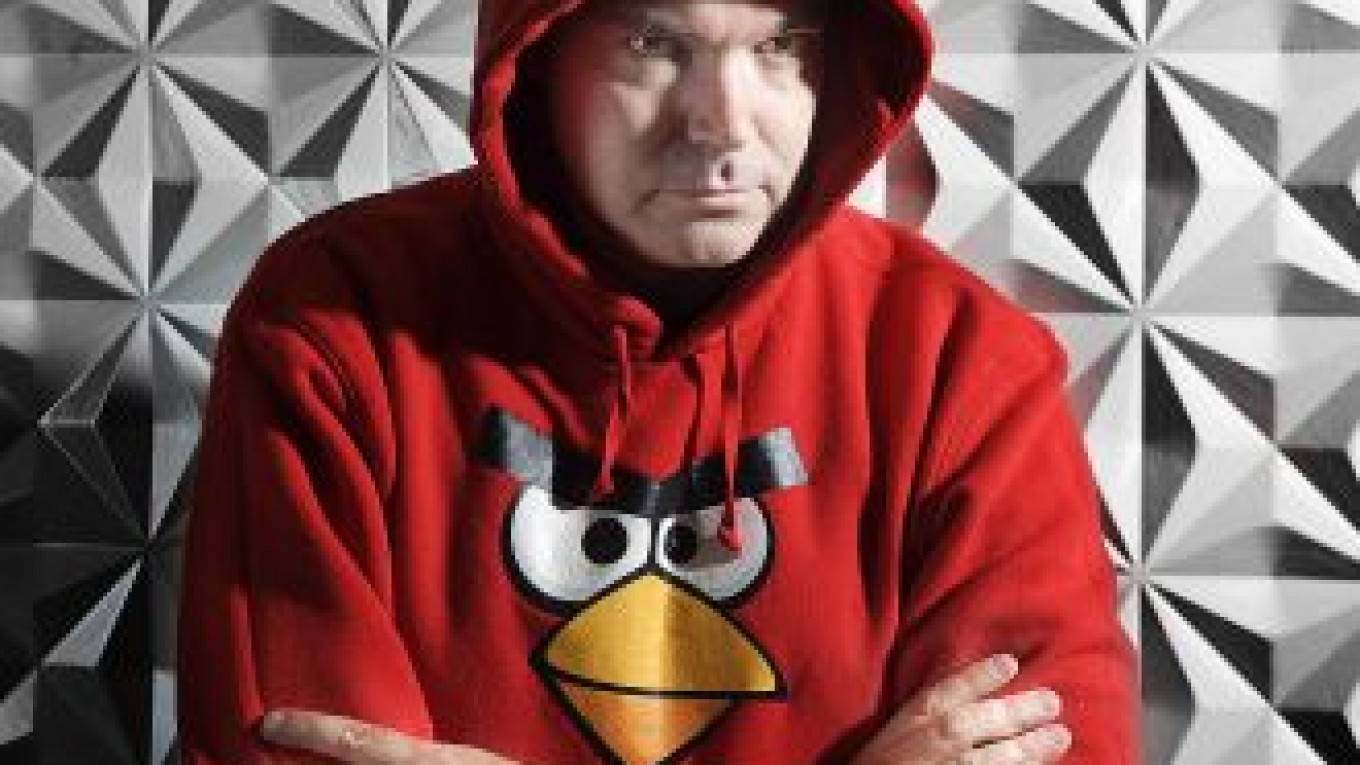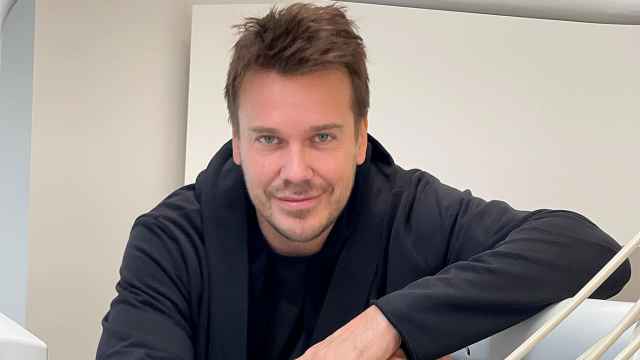Finding Peter Vesterbacka in a crowd isn't hard. It's not just that he's the one not wearing a suit … anymore. His bright-red hooded sweatshirt is adorned with a stern-looking cartoon bird. His man-purse is, too. Several of the creatures also dangle from his suitcase.
Your natural instinct is to want to walk up and ask, "What's the deal with the birds?" And that is exactly what Vesterbacka wants you to do — whether you are one of the few people who don't recognize an Angry Bird when you see one, or one of the half a billion people on the planet who are addicted to the world's most popular computer game.
Education
Two years of college, degree in marketing never completed
Work Experience
1992-2006 — Hewlett-Packard, global leader for HP Bazaar 2006-Present — Some Bazaar, a social media incubator
2006-Present — Wreckamovie, an open-source software company
2010-Present — Rovio, an entertainment media company
Favorite book: “Angry Birds: Bad Piggies’ Egg Recipes” (2011) by various authors
Reading now: “Steve Jobs” (2011) by Walter Isaacson
Movie pick: “The Matrix” (1999) directed by Andy and Lana Wachowski
Favorite Moscow restaurant: So many good ones, have not been to many more than once, so can’t really name a favorite.
Weekend getaway destination: Barcelona is always good.
The success of "Angry Birds" has taken on geopolitical significance: President Dmitry Medvedev, half jokingly, personally thanked Vesterbacka during the St. Petersburg International Economic Forum last summer for creating the game and distracting so many government officials from their work.
For now, Vesterbacka and Rovio, the company he helped give birth to while he was still a visionary marketing manager at Hewlett-Packard, are enjoying the glory and managing the challenges of high-speed, high-growth, high-profit success.
Therein lies the irony of his career. Vesterbacka came to HP with the mission to get the company even deeper into its core vertical segment: supplying solutions to the telecoms industry.
The Finn, still wearing a suit at the time, invented the HP Mobile Bazaar — an incubator designed to support startups working on content solutions for mobile operators, introduce the operators to new concepts, and help salespeople maximize HP's revenue. All along, the idea was to make all the players think outside the box and consider new possibilities.
But corporations move slowly, and their cultures and leaders change. Vesterbacka left when he got fed up with the hypocrisy that he perceived there, saying he tried to "do the right thing" but management was concerned only about jobs and careers.
He was soon invited to join Rovio, one of the companies born in the Mobile Bazaar, which had just created its 51st game in which distressed birds take their revenge on egg-stealing pigs.
He glanced south from their office in Helsinki and took as a role model "Tetris" — which at the time was the most popular video game in the world, born at the Soviet Academy of Sciences in 1984 and the first entertainment software to be exported from the Soviet Union.
Vesterbacka, 43, sat down with The Moscow Times while attending a recent conference in Moscow to expand on his view of innovation in corporations, startups and Russia; how to survive and thrive with such growth; and how to masterfully manipulate the marketing hook.
This interview has been edited for length and clarity.
Q: What was the moment you realized that you didn't want to work for a big company anymore?
A: I ended up one Friday night on a conference call with my boss and his boss. It was 6 p.m., and I was driving home from the office. A third person joined in from the HR department. My boss' boss said, "I thought I already told you: 'I'm in charge, I decide, no discussion.'" I listened to the grumbling from this clueless dude; I got off the call and called back my immediate boss and said I want to get out. I hate it when people say, "I know that we are doing the wrong things, but it's my job." We even had the HP chief technology officer telling me this. I said, "Wait a minute. You are the CTO and you are thinking this? How can you say that?" So you have these people who view it as just a job saying out loud that they are doing the wrong things. How can that be part of anyone's job? Show me the part of your job description where it says you should do the wrong things.
Q: Is it fundamentally impossible for large companies to do creative things?
A: Yes. I looked at so many companies. Looking at Nokia now, I see that it did amazing things for a long time. But it grew bigger. It created a very complex matrix organization. It was the same as HP. You had to have so many meetings and drink so much coffee before you could find someone who could actually make any kind of decision. I think Nokia has the same thing: You should talk to that guy, and that guy, and that guy. In the end, nobody cares, nobody takes responsibility, nothing gets done. I think that's really dangerous.
Rovio is tiny, but we are growing fast and everyone knows where we're going and what we are doing. If you lose track of your reason for being, your goals, then you have a leadership problem. That's what happened at HP and Nokia.
If you look at HP, the last new and big business was printers, and they did not get into that by design. A few people were told to go to Boise, Idaho, away from the corporate antibodies, and they tugged HP into the printer business — even though they were told not to, that HP was not a printer company. Change only happens when people take responsibility into their own hands and do something, even though management is telling them not to.
I really think that big companies are incapable of creating any kind of innovation. Apple is the exception that confirms the rule. Steve built an amazing organization with his leadership and vision.
This is interesting when you look at Skolkovo. It's good to have a goal that people can get excited about and understand, "That's where we need to go." What you need to do in Russia is to get the small innovative companies going as startups. You can attract big companies like Cisco, HP and Apple, but they are not going to have any impact on the economy.
You need to support the small furry animals and not the dinosaurs. The dinosaurs are not going to be around forever.
Q: So what's the best approach for innovation in Russia?
A: You start to have some role models like Yury Milner and the Yandex people. They show their success, that they are making money. You saw this in Silicon Valley. People worked in the big companies and then left and started their own. Sometimes they turned into Apple and Google. It will be the same thing here. People will be leaving the Mail.ru's and Yandexes and start their own companies. It takes a long time, but the fastest way is to get these role models in place. People see that that guy was successful after leaving Yandex, and if he can do it, so can I.
That's what I've been telling people here, "Look at us: We are a tiny company from a tiny country. Look at Russia: It's huge with all these resources and talent. There is no reason why you can't create something like Google or Apple out of that here."
It's about attitude. You have to have crazy ambition, that's what it boils down to. Doing a startup is not the most rational thing. You are probably not going to be successful. The odds are against you, challenging the big companies. When I look at Rovio, we are crazy. We have crazy ambition and a can-do attitude.
It's been less than two years with "Angry Birds." I think it's important to realize that we are only getting started. If you ask anyone in the company, the reaction is, "OK, yeah, fine, all these people are congratulating us, but for what?"
Q: Are you optimistic that innovation drive will succeed here?
A: Yes, I think it's a good thing to do. The only success outside of oil and gas and raw materials is on the Internet side here: Mail.ru and Yandex more recently.
You can say a lot of things about the government here, but they understand the idea that the Internet should be unregulated. The government is much more progressive than France or Germany, or even the United States in some respects. Eventually that will mean that you get more freedom and democracy as well. It's very different from China, where everything is controlled. I think that's a really good thing going forward and there will be a lot more Russian Internet successes.
Q: When you joined Rovio, was "Angry Birds" already made?
A: It had been up a couple of months, with 1 million or 2 million downloads. It was getting there. When I joined, I said our goal was 100 million downloads. I started giving more ambitious goals, talking about our "Tetris" strategy. There's the Russian connection. Before "Angry Birds" came along, "Tetris" was the biggest game with the most downloads — 100 million. I just bought my son the "Guinness Book of World Records" — the 2012 edition — a month ago, and there are two pages on games where they still list "Tetris" as the biggest game ever. We now have 500 million downloads, and we did that in two years. It took "Tetris" 20 to 25 years.
Q: Did you take "Tetris" as something to emulate?
A: Yes. We started with our "Tetris" strategy — not only the volume, but also getting onto all screens. We want to be on all phones, the web, TV, PCs and Mac consoles — everything.
Our strategy was to create games until we had something successful in the app store, and then we would go everywhere, to all platforms. That's what happened. When I started talking about the 100 million downloads, nobody believed me. I'm used to that. But I didn't expect it to happen as fast it did. It's been amazing. Dec. 11, 2009, is the date we started — actually now we call it Angry Birds Day. We celebrate that. The first year we hit 50 million. It was amazing, a big number.
Then in March, we hit 100 million. For that, of course, we had a countdown in the office on a big screen. We realized we were doing something that hadn't been done before. Our team consisted of 30 people at the time.
So what happened? We had some champagne, said a few words, but then five minutes later the whole company went back to work. It was like, "No big deal."
Then we hit 200 million, 300, and then in early November we hit 500 million. It's a crazy number: a half a billion downloads. In less than two years. And it's still accelerating. We'll probably end up this year between 600 and 700 million downloads.
Q: What will you do after that?
A: When we hit half a billion, we had a bit of a celebration, but now the whole company is totally focused on another goal that I set: to make "Angry Birds" into the first entertainment brand that has a billion fans. Not a billion downloads, but a billion fans. We measure it by monthly active users. It's pretty big: Facebook has 800 million active monthly users. We have analytics built in so we know how much people play and for how long. We are tracking that. So we have a goal of a billion fans. When? I am thinking it will take us two to three years, but everything is going so fast.
We did a funding round in March, raised $42 million from private investors. We didn't need the money— but we wanted to get some great people involved, so we brought onboard Jim Breyer and Rich Wong of Accel, Niklas Zennström, founder of Skype, and Aydin Senkut of Felicis Ventures.
When I look back, that feels like years ago. But it was only March. Everything has been going crazy fast. At the beginning of last year our team was 12 people, now we are 200, and we have 100 open positions. We've grown pretty fast. Next year we will be 700 people. It's the fastest-growing brand ever.
Q: What are the management challenges with such fast growth?
A: We have a three-person leadership team. It's very hands-on for key hires and a big challenge. We have weeks when 30 new people start on a Monday morning. That means everybody is new, and that comes with its own set of challenges. I travel two-thirds of the time. When I get back to the office, I notice. Now we have several floors in the building. I can tell if people are working for us if they get off on the same floor.
It helps to cope with the growth that we are extremely successful. It keeps problems in perspective. Everyone understands that everything is new. It becomes part of the corporate culture.
The first day they are just amazed at how fast things are going. It's part of my thinking, and I have put it in the corporate culture that people learn very quickly that we can do anything. No matter how big the idea, the goal, people just say, "Yeah, of course we can do that."
Q: So what comes after "Angry Birds"? "Happy Pigs"?
We are expanding to physical merchandise. We've sold 10 million toys. We are the most-copied brand in China. I've seen so many fake "Angry Birds" products, even here in Russia. It just shows that the brand is very powerful and really loved.
Of course, we'd rather sell the licensed product. Some of our guys were just over here and signed a distribution deal in Russia, so we'll have our toys and products in stores here. We might get first shipments quickly, but everything is selling out, flying off the shelves. We've created a board game with Mattel. It's one of the best-selling board games ever. We also bought an animation studio in Helsinki in the summer. So we are getting serious about animation. We are wrapping up some short bits and will make some feature-length movies now. The goal is to do Pixar quality.
We know we can do a lot with our game. We are building a massive distribution network on the back of Angry Birds. So we are building new brands, developing new franchises, and we can roll those out to all our fans.
We will not stop with "Angry Birds." It's the early days. We'll take it as far as we can and then introduce more later. Next year, we'll do a handful of new "Angry Birds" games. Our birds will come out in lots of interesting places.
Incidentally, Russian cosmonauts took an "Angry Birds" toy to space on the last launch.
Q: How did the Medvedev comment come about?
We were sitting there and Medvedev walked in and sat for a few minutes and listened. Then he grabbed the microphone and said, "OK, before we talk politics, I want to thank Peter Vesterbacka for 'Angry Birds' and for giving Russian politicians and bureaucrats something to do during their free time, and also during working hours."
He went on to say he doesn't know how many versions of "Angry Birds" there are, but he's sure there will be more and be very successful. I think he plays the game quite a bit himself.
I was not surprised by Medvedev's attention to me in St. Petersburg. I expected it. I had heard he was around and interested in technology, but also I was wearing my red hoody. The rest of the people on the panel were in their serious business attire. So when you walk in and see these guys on the stage and you see one guy wearing a red hoody — and of course Medvedev knows the game — what would you expect to happen?
It's part of our marketing and branding. With "Angry Birds," the name itself leads to the question: Why are they angry? It spreads by word of mouth, from person to person. Then people download the game to find out more. That's why we have half a billion downloads. And we have spent nothing on advertising. That's another reason we are insanely profitable. We don't waste any money on ads.
You know, I've been in training for the last 20 years for the current job with Rovio and "Angry Birds." I know what I'm doing. It just took me a while to figure it out, but I'm still learning new things every day.







